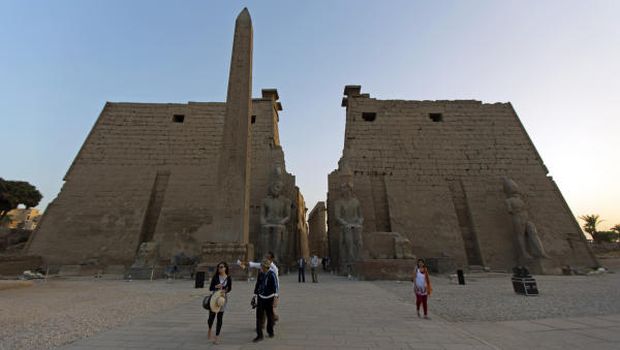
On this Wednesday, April 30, 2014 photo, tourists visit Luxor Temple, a large ancient Egyptian temple complex on the east bank of the Nile River in Luxor, Egypt. (AP Photo/Khalil Hamra)
Dubai, Reuters—Egypt’s tourism minister on Sunday announced ambitious plans to try to revive the country’s tourism sector, in distress after years of political turbulence.
Government data showed last month that tourism revenue dropped 43 percent to 1.3 billion US dollars in the first quarter of this year.
Egyptian Tourism Minister Hisham Zazou said in an interview in Dubai: “The world will see tourism returning to Egypt. We have an ambitious global plan to show the world that it is safe and fun to visit Egypt anytime.”
Egypt’s Islamist insurgency has largely spared tourist sites, but on Friday suicide bombers hit near the tourist resort of Sharm El-Sheikh, killing a soldier and wounding at least eight other people.
Three South Koreans were killed in February when a bomb hit a tourist bus in South Sinai near a border crossing with Israel.
Zazou said: “Our plan is to attract more than 25 million tourists by 2020. Revenues generated will double from the 2010 peak of 12.5 billion dollars to 25 billion dollars within the coming six years.” He added that India, China and Latin America would be major target regions in a marketing campaign.
The tourist sector hopes that Egypt’s political climate will become more stable.
Speaking in Dubai less than four weeks before the country’s planned presidential election, Zazou said Egypt is gearing up for a fresh new start with a new president and a parliament.
“Tourism in Egypt has its captive audience and the major flow of tourists will happen once the political scene is settled,” he said.
Egyptians will vote on May 26–27 in a presidential election that Abdel-Fattah El-Sisi is expected to win easily, meaning the former army chief who deposed Islamist President Mohamed Mursi could be sworn in as head of state by early June.
Latest government figures show that tourism currently contributes 11.3 percent of Egypt’s GDP and brings in 14.4 percent of foreign currency revenues.
More than 14.7 million tourists visited Egypt in 2010, dropping to 9.8 million after the revolution that toppled former President Hosni Mubarak. The sector picked up in 2012, attracting 11.5 million but shrank again to 9.5 million last year after various attacks on tourist destinations.
But the tourism ministry is launching this week a three-year marketing campaign in the hope of attracting tourists and investors to the country, probably the country’s last hope in fixing its own internal finances without relying on aid from neighboring Gulf states.
“We are currently negotiating agreements to prevent double taxation on airlines and tourist agencies. We want to partner with companies like Emirates Airlines and Etihad Airways to bring in tourists to the country. There’s a well-prepared plan in place,” Zazou said.
Saudi Arabia, Kuwait and the United Arab Emirates pledged more than 12 billion dollars in aid to Egypt after the army toppled Mursi on July 3 following mass protests against his rule.
Zazou called on companies in the United Arab Emirates like property developer Emaar Properties and hotel management firm Jumeirah to invest in the Egyptian market.
The government earlier this year sold five plots of land on the Red Sea coast and plans to initiate new investment opportunities for local and international investors.
“We had valued the square meter in this area at 38 dollars but it was sold at more than 150 dollars per meter at the auction. Investors buying the land must know the value of what they’re getting.”
